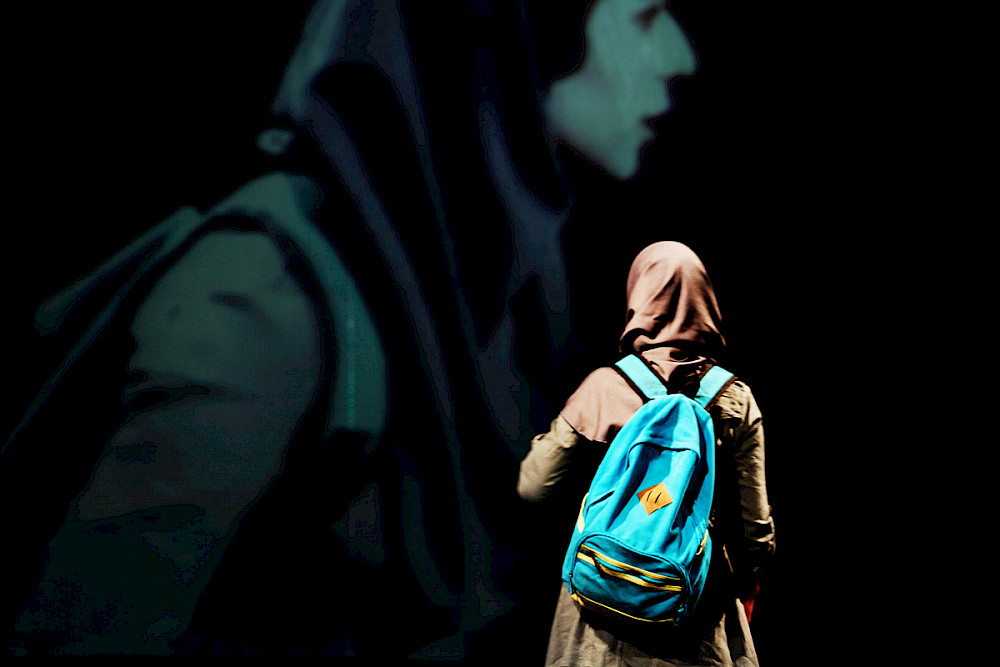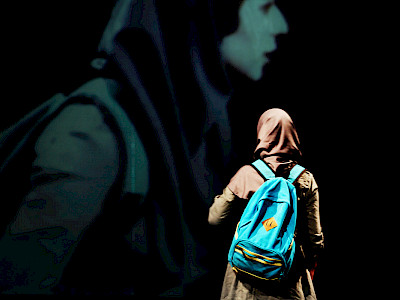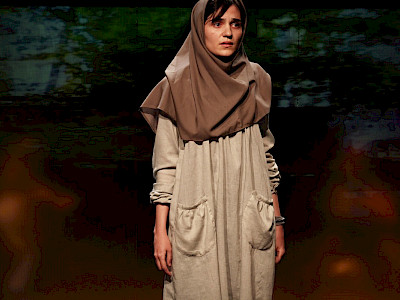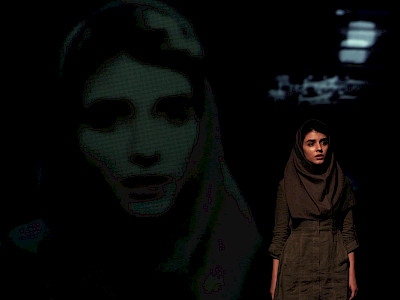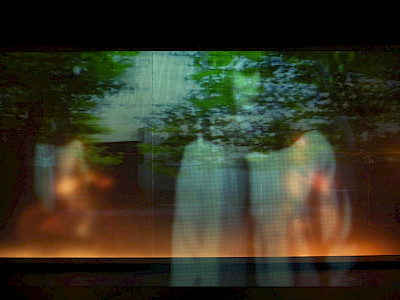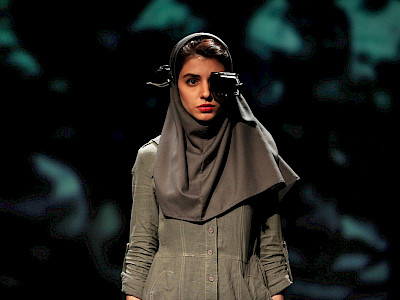23 — 26.05.2016
Amir Reza Koohestani / Mehr Theatre Group Tehran
Hearing
theatre
Farsi → NL, FR | ⧖ 1h10 | € 16 / € 13 | Meet the artists after the performance on 24/05
In the girls’ dormitory at an Iranian university, a man’s voice is heard. That’s the starting point of Hearing, a penetrating new piece by Amir Reza Koohestani. The Iranian theatre maker drags us into a Kafkaesque labyrinth of rumours and insinuations, where fragments of text and video flow through each other and increasingly blur the boundary between fact and figment. The narrative complexity is further brought to a head by the alternating of text and camera images. The women are determined and unyielding. They want to shed the stifling social conventions, but are trapped in an oppressive system. Their opposition is subtle but no less poignant for it. The spectre of the surveillance society haunts the space. The script is layered and razor-sharp and the direction sober and subdued, as we are accustomed to with Koohestani. Hearing is a compelling meditation on elusive threat and absence. Will the truth surface?
See also
Iranian Theatre Today: Another Look
What We Leave Unsaid
A Bit More Every Day – Ham Havâyi
Hearing
Where I found my inspiration
Mahin often told me about life in her dorm. I myself spent a year living in a dorm, but it sounded very different for girls – even if bringing a girl into the boys’ dorm was every bit as forbidden as the other way around. So I had to admit that I’d need to talk to a few people with first-hand experience to be able to describe life in a girls’ dorm with any accuracy.
Hamed Nejabat, the stage manager of my shows, had written a play that was to be shown in a girls’ high school. It was called We 15 and was about 15 students who get good grades in a chemistry exam and whose teacher suspects them of seeing the questions beforehand and who interrogates them. But unlike the girls in Hearing, they stick together and don’t denounce anyone.
I read that a Swedish court asked asylum seekers to provide video evidence of taking part in demonstrations to prove they’d been politically active in their country.
A while ago, when I was watching Kiarostami’s film Homework for the second or third time, I found the kids’ reactions to the filmmaker’s simple questions strange. They seemed stunned to be asked ‘What does being encouraged mean?’ or ‘Did you do your homework?’ and stared open-mouthed at the ceiling or the camera. I’m not one to judge these kids’ mental health, but it’s obvious that today, if a child was so terrorised at the simple thought of being left alone in a room with a film crew that they started to cry or asked to leave or for the door to be left open, you’d take them to a see a psychiatrist or therapist. At the time though, in the middle of the Iran-Iraq war, people’s only worry was to survive and escape unscathed from the continuous bombing by Saddam Hussein’s army. Only a Kiarostami then could think about the mental and psychological well-being of the youngest. I learned later that one of the children was Kiarostami’s own son, Bahman. And I remember that the first time we met, when he learned that I was born in 1978, he pointed out that I was the same age as his son. So those kids could also have represented me. No doubt I was like them – if not worse. How could I now find myself in the pose of an intellectual with things to say about the state of his country and the world, having been such a lost and distraught child? I drew inspiration from Homework to try to discern beneath the adult Samaneh the terrorised adolescent fidgeting nonstop with her headscarf.
How I wrote the play
It took me far longer to build the structure of the play than to write the dialogues. During a writing residence of a few months I benefitted from in Stuttgart, rather than sitting at my desk writing, I spent my time walking in the Black Forest to think about the form the play could have, and the one thing I knew was that it would be about the ‘hearing’ of a male voice in a female dorm. Of course it would have been much simpler if everything took place in the interrogation room. The audience would no doubt have left the play happier, reassured to have understood everything and seen what they like: doctrinaire extremists persecuting defenceless young girls for something they didn’t do. Clear and simple, in line with the information broadcast continuously by public and private channels alike – including Arte. But it turns out that reality is different.
Contrary to what we might imagine, the interrogation isn’t carried out by some hairy-faced fundamentalist, but by a student who had been given the dorm key, simply because she’s a bit older. She isn’t interrogating the others out of any extremist religious or political conviction, but simply because she’s managed to keep her copybook clean up till then and doesn’t want any trouble.
If people only had to justify themselves to suspicious inspectors in countries like Iran, we could sleep safe in the knowledge that the methods and laws of ‘countries like that’ have to be changed, but that ‘we’ are irreproachable. It’s the discourse of all the right-wing parties these days. But in reality, the authorities all over the world who don’t question their legitimacy like to sit in front of you and ask you to prove you’re not lying.
Samaneh wrongly refuses to testify in Neda’s favour when she was expected to. Neda gets expelled from the university and commits suicide ten years later in Sweden because her demand for asylum is refused – and not because she was expelled from university. The question then is how much is Samaneh to blame for Neda’s death. In her place, would we feel guilty or would we wash our hands of the whole affair, arguing it’s all in the past? If by any chance we share Samaneh’s bad conscience, we have to ask ourselves why we don’t feel the same about the children killed in Syria or Iraq by bombs paid for by our taxes, or about future generations we’re leaving a fairly degraded environment to. A few likes or shares on Facebook, a few petitions signed in cyberspace and our sins seem to be forgiven. When I got back from my last walk in the Black Forest, an outline like this came to mind: an attempt by Samaneh, twelve or thirteen years later, to give different answers to the questions asked, in the hope of changing the past.
Am I a feminist?
Hearing is my first play that isn’t mixed. The previous ones always featured the confrontation of the two sexes. Six of them were about couples. And this time, it’s women only. Does that make me a feminist? The answer is no. I don’t feel in a position to express an opinion about women’s condition. If I did that as a male writer, I’d feel like those tourists who go to India with a point and shoot camera and take some pictures of women in saris, cows, men hanging onto trains and buses, and then come home. I don’t know any more about women’s issues than those tourists do about India. The most I can do, through the presence of four actresses in this show, is to ask them to enlighten me about how close my outsider’s view is to reality.
Amir Reza Koohestani
May 2016
Text & direction
Amir Reza Koohestani
Direction assistance
Mohammad Reza Hosseinzadeh, Mohammad Khaksari
With
Mona Ahmadi, Ainaz Azarhoush, Elham Korda, Mahin Sadri
Video
Ali Shirkhodaei
Music
Ankido Darash & Kasraa Paashaaie
Sound
Ankido Darash
Lighting
Saba Kasmaei
Stage
Amir Reza Koohestani & Golnaz Bashiri
Costumes & props
Negar Nemati
Costumes & props assistance
Negar Bagheri
Stage assistance
Mohammad Reza Najafi
Translation & subtitling
Massoumeh Lahidji
Production management
Mohammad Reza Hosseinzadeh, Pierre Reis
Company & tour manager
Pierre Reis
Presentation
Kunstenfestivaldesarts, BOZAR
Production
Mehr Theatre Group
Co-production
BOZAR Centre for Fine Arts (Brussels), La Bâtie – Festival de Genève, Künstlerhaus Mousonturm (Frankfurt)
Project presented with the support of
Onda (Office national de diffusion artistique)
Written during a residency at Akademie Schloss Solitude in Stuttgart (October 2014-March 2015)
